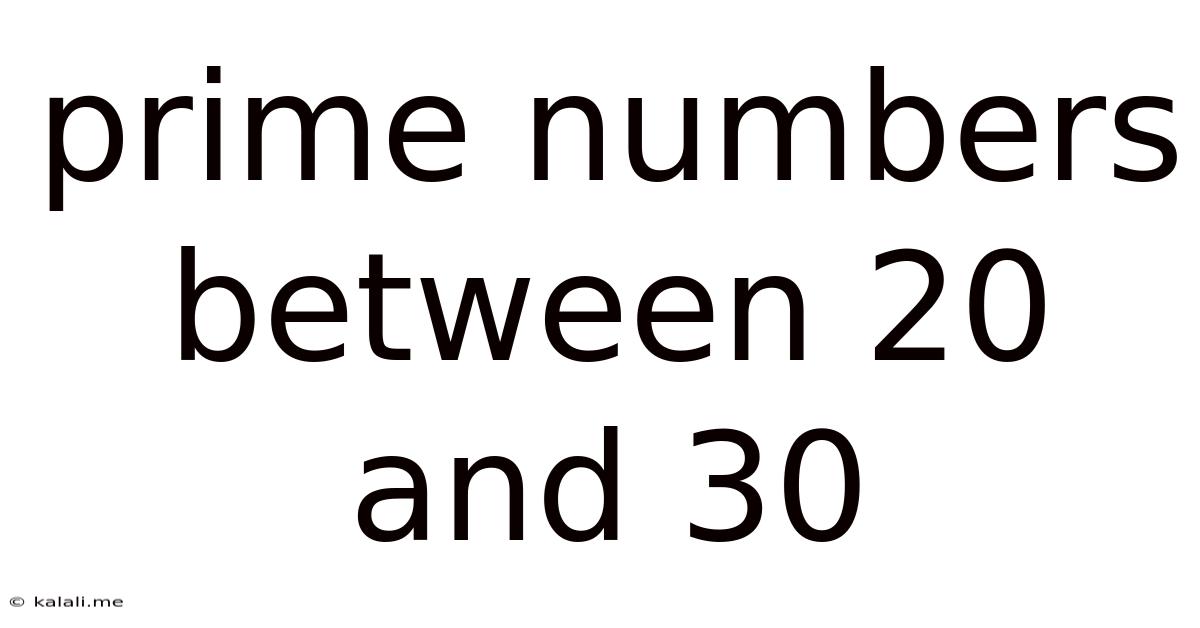Prime Numbers Between 20 And 30
Kalali
Jun 11, 2025 · 2 min read

Table of Contents
Prime Numbers Between 20 and 30: A Deep Dive
Finding prime numbers within a specific range is a fundamental concept in number theory. This article delves into identifying the prime numbers nestled between 20 and 30, exploring the definition of prime numbers and illustrating the process of identifying them. Understanding this seemingly simple task lays the groundwork for more complex mathematical explorations.
What are Prime Numbers?
A prime number is a whole number greater than 1 that has only two divisors: 1 and itself. This means it's not divisible by any other whole number without leaving a remainder. For example, 7 is a prime number because it's only divisible by 1 and 7. Conversely, 6 is not a prime number (a composite number) because it's divisible by 1, 2, 3, and 6. Prime numbers are the building blocks of all other whole numbers through a process called prime factorization. This process is crucial in cryptography and other areas of computer science.
Identifying Prime Numbers Between 20 and 30
Let's systematically examine the integers between 20 and 30 to identify the primes:
- 21: Divisible by 3 and 7. Not a prime number.
- 22: Divisible by 2 and 11. Not a prime number.
- 23: Only divisible by 1 and 23. A prime number!
- 24: Divisible by 2, 3, 4, 6, 8, and 12. Not a prime number.
- 25: Divisible by 5. Not a prime number.
- 26: Divisible by 2 and 13. Not a prime number.
- 27: Divisible by 3 and 9. Not a prime number.
- 28: Divisible by 2, 4, 7, and 14. Not a prime number.
- 29: Only divisible by 1 and 29. A prime number!
Therefore, the prime numbers between 20 and 30 are 23 and 29.
Practical Applications and Further Exploration
The seemingly simple task of identifying prime numbers has significant implications in various fields. Prime numbers form the backbone of many encryption algorithms used to secure online transactions and communications. Understanding prime numbers is crucial for studying modular arithmetic, a branch of number theory with wide-ranging applications in computer science and cryptography. Further exploration might involve investigating the distribution of prime numbers (using the Prime Number Theorem) or exploring algorithms for efficiently finding large prime numbers. The study of prime numbers continues to be a fascinating and important area of mathematical research. Learning about twin primes (pairs of prime numbers that differ by 2, like 3 and 5, or 11 and 13) is another interesting avenue for further investigation. The quest to understand prime numbers remains a vibrant area of mathematical inquiry.
Latest Posts
Latest Posts
-
How Many Cups Is 238 Grams Of Miralax Powder
Jul 01, 2025
-
How Much Is Half A Billion Dollars
Jul 01, 2025
-
How Many Days Are In 9 Years
Jul 01, 2025
-
How Much Is 1 8 And 1 8 Teaspoon
Jul 01, 2025
-
How Many Feet In A Quarter Acre
Jul 01, 2025
Related Post
Thank you for visiting our website which covers about Prime Numbers Between 20 And 30 . We hope the information provided has been useful to you. Feel free to contact us if you have any questions or need further assistance. See you next time and don't miss to bookmark.